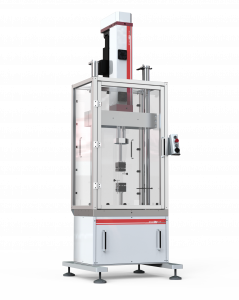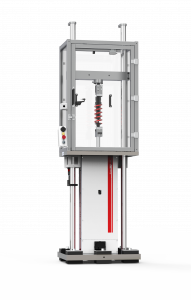What is a shear test?
A shear test is specifically engineered to subject a test specimen to stress, inducing a sliding failure along a plane parallel to the applied forces. Typically, shear forces prompt one surface of a material to move in one direction while the opposing surface moves in the opposite direction, resulting in stress through a sliding motion. Contrary to tension and compression tests where forces are perpendicular to the contact surfaces, shear tests involve forces that run parallel to these surfaces.
What is the purpose of shear testing?
The primary application of a shear test lies in assessing the shear strength of a material, representing the maximum shear stress it can endure before failure. This characteristic holds significant importance in the design of various fasteners, including bolts and screws. For instance, in scenarios where a bolt secures two plates, any parallel forces acting on the plates may subject the bolt to shear forces. If the fastener fails under shear stress, it could trigger a series of failures, potentially resulting in the collapse of a larger structure.
How to perform a shear test?
In order to properly conduct a shear test properly, there are several steps that must be followed.
First of all, there are two common types of shear tests commonly used.
The first involves setting up the sample in a modified three-point flexure or four-point bend fixture. In this test, the sample is loaded to experience double shear, with forces applied at two locations. Anchoring each end of the sample, the force is exerted over the middle section, aiming to remove it so that both ends remain intact.
The second test method requires the sample to have tapered ends, each inserted into grip fixtures offset from the vertical axis of the sample. Tension is then applied to pull the opposite faces of the sample in opposing directions, assessing its shear resistance.
Material in shear testing
Shear testing commonly encompasses three materials: rigid substrates, adhesives, and layered composites. Rigid substrates, which can comprise metals, plastics, ceramics, composites, or woods, typically manifest in solid forms and serve as foundational elements or fasteners in various constructions. Adhesives, on the other hand, are employed to bond two materials and undergo shear stress when subjected to opposing directional forces, aiming to separate the bonded materials. Layered composites undergo shear stress akin to adhesives, as the applied shear forces act upon the adhesive or laminate responsible for binding the composite layers together.
Popular standards in shear testing
- ASTM D732 – Shear Strenght Testing of Plastics
- ASTM D1002 – Adhesive Lap Joint Shear Testing of Metals
- ASTM D1037 – Wood-Base Fiber and Particle Panel Strenght Testing
- ASTM D3846 – In-Plane Shear Strenght of Reinforced Plastics
- ASTM D4762 – Polymer Matrix Fiber Reinforced Composites Test Equipment
- ASTM E143 – Torsion Shear Modulus Test Equipment
- ISO 1827 – Shear Adhesion Rubber to Metal Test Equipment
- ISO 4587 – Adhesive Lap-Shear Strenght of Rigid-to-rigid Bonded Assemblies
- ISO 10123 – Shear Strenght of Anaerobic Adhesives
- ISO 14129 – Fibre-reinforced plastic composites — Determination of the in-plane shear stress/shear strain response, including the in-plane shear modulus and strength, by the ±45° tension test method
Shear testing machines
EA SERIES
Electromechanical actuators
UD SERIES
Linear motor testing machines




